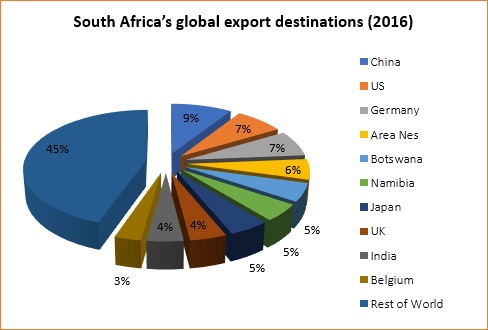Blog
A Letter to Mr. Ramaphosa: South Africa in Africa

The election of Mr. Ramaphosa as ANC leader has caused a flurry of optimistic expectations at home and abroad. South Africans (and others) are eager for good news. Mr. Zuma’s presidency will be remembered for its lack of honesty and inaction in the face of overwhelming evidence of state capture and endemic corruption. However, the failures are more pronounced. While continually extinguishing fires at home, the development of a proper regional and continental policy framework for engaging Africa, a vital trading partner for South Africa, was neglected.
Zuma’s legacy has paralysed the capacity of the state to steer the South African ship towards the implementation of sound economic policies, to address the inequalities in the South African society, and to properly engage Africa. Mr. Ramaphosa’s vision of clean and effective rule requires the re-invention of good governance, the development of better policies, and restoring trust in the Government. He has said in one of his speeches in Davos that it “is this corruption that has been permeating throughout the country, which is impeding growth.”[1] Regulatory and policy reforms are vital, as his emphasis on the need for a thorough discussion of the Mining Charter recognises.
There are many still in powerful positions who will resist the tide of clean governance. This is typical of what happens in corrupt societies. Turning the boat around is fraught with political danger and cannot happen overnight. However, there is no alternative but to implement and clarify the agenda on which Mr Ramaphosa has been elected.
The need for comprehensive change and inherently consistent policies requires a new discourse about all the issues neglected under President’s Zuma’s watch. The pursuit of sound economic development policies belongs on Mr. Ramaphosa’s eventual to-do list. The policy changes mentioned by him (such as the need for “strong partnerships” mentioned in his maiden speech in East London) involve a logical extension towards regional trade and integration. As the re-invention of good governance at home advances, additional challenges and broader issues will have to be addressed. The proper engagement with Africa will be one of them.
Southern Africa is a region of mutual dependence. South Africa is the region’s major economy and Africa (as a group) is now the most important destination for South Africa’s merchandise exports. To put South Africa’s trade relations in perspective, it is notable that, in 2016, exports to Botswana and to Namibia exceeded South Africa’s exports to the United Kingdom (see below).

Source: TradeMap (www.intracen.org)
New questions need to be asked about how this reality is translated into inclusive growth for all Southern African states and a pathway towards a stable region. South Africa’s present emphasis on industrialization for jobs at home could be interpreted as a South Africa first approach. It needs to be re-examined and refined.
Why is a different emphasis needed? The simple answer is that South Africa cannot prosper in an unstable region. Pretoria’s present policies (such as the National Development Plan) fail to put sufficient emphasis on this aspect and the linkages to an inclusive regional agenda. We should be the engine of inclusive regional growth, not the regional hegemon.
It is also important to look beyond Southern Africa – member states of the African Union are convening an Extraordinary Summit, on 21 March, to sign the Continental Free Trade Agreement. This continental integration initiative motivates strongly for the development of a comprehensive Africa strategy. South Africa can play a constructive role in how this can come about.
Mr Zuma’s departure will leave his successor with many challenges. One of them will be to re-invent South Africa’s engagement with Africa. It will be to our advantage.
[1] https://www.biznews.com/wef/davos-2018/2018/01/25/ramaphosa-off-piste-davos-straight-talk/
About the Author(s)
Leave a comment
The Trade Law Centre (tralac) encourages relevant, topic-related discussion and intelligent debate. By posting comments on our website, you’ll be contributing to ongoing conversations about important trade-related issues for African countries. Before submitting your comment, please take note of our comments policy.
Read more...




